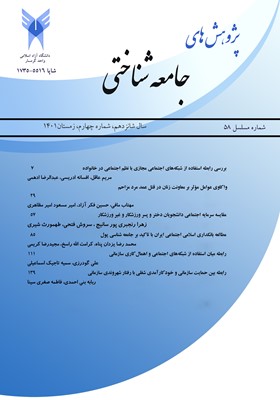بررسی رابطه استفاده از شبکه های اجتماعی مجازی با نظم اجتماعی در خانواده
محورهای موضوعی : در این فصلنامه موضوعات جامعه شناختی در اولویت چاپ هستند و موضوعات نزدیک به جامعه شناسی در اولویتهای بعد قرار می گیرند
مریم عاقل
1
,
افسانه ادریسی
2
*
,
عبدالرضا ادهمی
3
![]()
1 - دانشجوی دکتری جامعه شناسی فرهنگی، واحد تهران شمال ،دانشگاه آزاد اسلامی ، تهران، ایران.
2 - استادیار و عضو هیأت علمی گروه جامعهشناسی، واحد تهران شمال ،دانشگاه آزاد اسلامی ، تهران، ایران.
3 - دانشیار و عضو هیأت علمی گروه جامعهشناسی، واحد تهران شمال ،دانشگاه آزاد اسلامی ، تهران، ایران.
کلید واژه:
چکیده مقاله :
خانواده از طریق گفتگو و برقراری ارتباط و تعامل کلامی می تواند پیوند عاطفی بین اعضای خود را حفظ نموده و مهمترین کارکرد خود که انتقال ارزشها و اجتماعی نمودن فرزندان است را از طریق مختلفی چون فرهنگ شفاهی به انجام رساند. گسترده شدن ارتباط افراد در شبکه های اجتماعی مجازی و جایگزین شدن این فضا در خانواده ها بهجای فضای واقعی و ارتباط رو در روی افراد، نظم در خانواده را دچار اختلال کرده است. ازاینرو در این پژوهش تأثیر استفاده از شبکههای اجتماعی مجازی بهعنوان متغیر مستقل اصلی و همچنین تأثیر سرمایه فرهنگی و سرمایه اقتصادی بهعنوان متغیر مستقل مداخله گر بر نظم اجتماعی در خانواده موردبررسی قرار میگیرد. هدف از پژوهش حاضر بررسی سرمایه فرهنگی و اقتصادی و نظم اجتماعی بر شبکههای اجتماعی میباشد. پژوهش حاضر توصیفی- علی و ازنظر روششناسی پیمایشی است. واحد مشاهده فرد است. سطح تحلیل خرد است. ازنظر زمانی، پژوهش حاضر، مقطعی است. ابزار موردنیاز در این پژوهش پرسشنامه محقق ساخته است. جامعه آماری پژوهش شامل شهروندان متأهل تهرانی است که 384 نفر بهعنوان نمونه انتخاب شدند. انتخاب نمونه با تلفیق نمونهگیری خوشهای و طبقهبندی نامتناسب صورت گرفت . تحلیل نتایج نشان داد نظم اجتماعی با استفاده از شبکه های اجتماعی مجازی همبستگی معناداری دارد، شدت این رابطه ضعیف ارزیابی می شود و جهت رابطه بین دو متغیر مستقیم است. بهعبارتدیگر با افزایش استفاده از شبکه های اجتماعی، نظم اجتماعی افزایش مییابد و بالعکس. نتایج نشان داد که با افزایش استفاده از شبکههای اجتماعی، افزایش سرمایه فرهنگی و افزایش سرمایه اقتصادی، نظم اجتماعی در خانواده افزایش مییابد و بالعکس. همچنین نظم اجتماعی در گروه زنان بیشتر از مردان است و با افزایش سن نظم اجتماعی نیز افزایش مییابد و بالعکس.
Through dialogue and communication and verbal interaction, the family can maintain the emotional bond between its members and fulfill its most important function, which is the transfer of values and socialization of children, through various ways such as oral culture. The expansion of people's communication in virtual social networks and the replacement of this space in families instead of the real space and face-to-face communication of people has disturbed the order in the family. Therefore, in this research, the effect of using virtual social networks as the main independent variable, as well as the effect of cultural capital and economic capital as an independent intervening variable on social order in the family is investigated. The purpose of this research is to investigate cultural and economic capital and social order on social networks. The current research is descriptive-causal and survey methodology. The unit of observation is the individual. The level of analysis is micro. In terms of time, the current research is cross-sectional. The tool required in this research is a researcher-made questionnaire. The statistical population of the research includes married citizens of Tehran, 384 of whom were selected as a sample. The sample was selected by combining cluster sampling and disproportionate classification. The analysis of the results showed that social order has a significant correlation with the use of virtual social networks, the intensity of this relationship is weak and the direction of the relationship between the two variables is direct. In other words, with the increase in the use of social networks, social order increases and vice versa. The results showed that with increasing use of social networks, increasing cultural capital and increasing economic capital, social order in the family increases and vice versa. Also, social order is more in the group of women than men, and social order also increases with age and vice versa.
_||_

